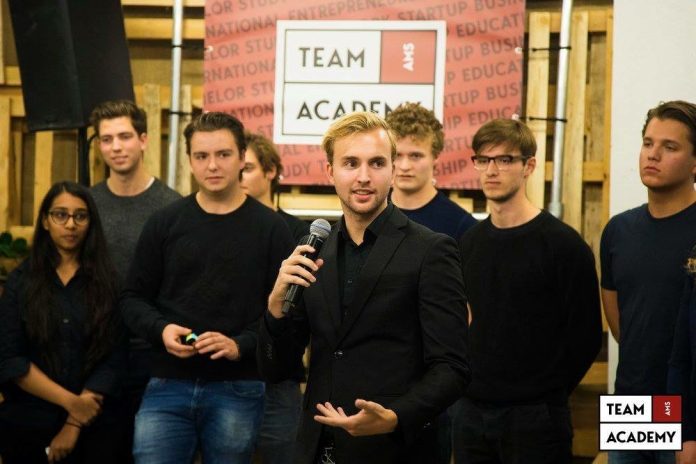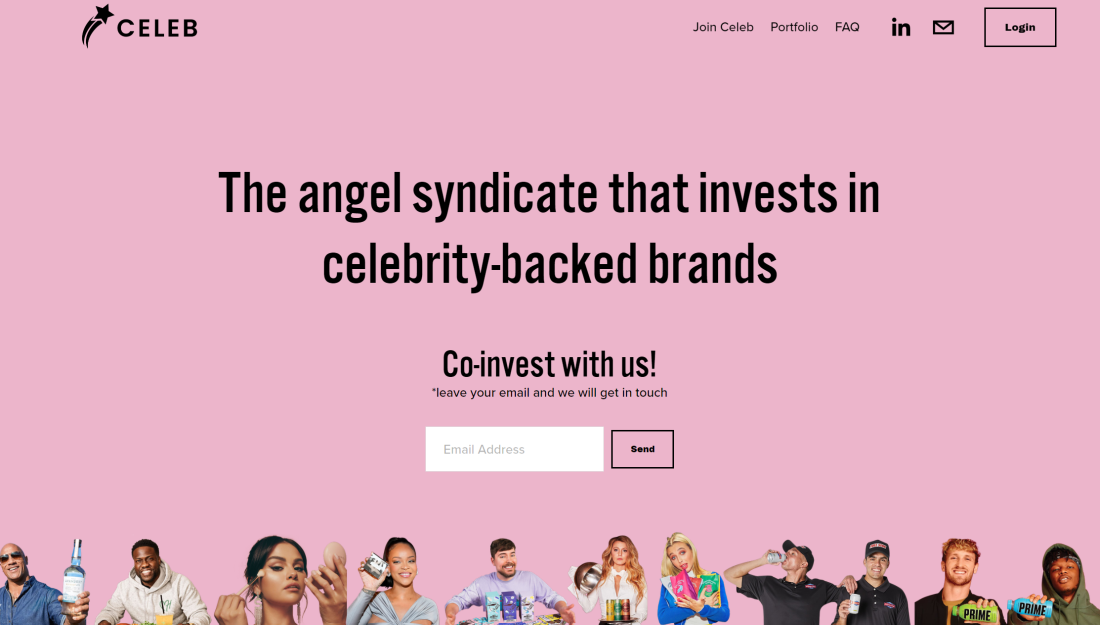Interview with Scott van den Berg, Founder of CELEB
Entrepreneur Scott van den Berg, founder of CELEB and Influencer Capital, talks to The European Business Review about the latest trends in influencer marketing and investing successfully in celebrity-founded companies.
Twelve years ago, the word “influencer” didn’t exist yet. Today, the influencer marketing industry is worth 21.1 billion dollars – and it’s not showing any signs of slowing down. However, trends emerge and evolve constantly. Scott van den Berg loves keeping his finger on the pulse, predicting what’s next, and building businesses that elevate the industry for creators, investors, and the public.
Van den Berg, a content creator himself, first started Influencer Capital, a company that facilitates equity deals between startups and influencers. Working with thousands of creators around the world, he saw an opportunity he decided to tap into: investing in businesses founded by people with large followings. CELEB was born – an angel syndicate that gives accredited investors access to these exclusive deals.
In this interview, Scott van den Berg talks to The European Business Review about the ever-changing influencer marketing space and touches on:
- How companies today can build genuine and long-lasting partnerships with influencers.
- Why AI is a game-changer and how it’s helping creators save time and make better content.
- The challenges he faced launching a syndicate when he’d never run one before. Only months after launching, CELEB already works with more than 200 accredited investors.
The influencer marketing industry has grown so much through the years. How do you see it evolving? Will people still trust and follow influencers in 10 years?
It’s true, that this industry has grown very much throughout the years, but what many people forget is that 12 years ago, the word “influencer” didn’t even exist yet. The influencer marketing industry is still new and is maturing every day.
The most recent change we see is the shift from the concept of “influencer” to the idea of “creator”. Many influencers don’t like being called “influencers.” They have a negative perception of the term. They don’t want to influence people’s behaviour but rather create content and give followers a look behind the scenes.
In the beginning, these influencers would promote any product because, for the first time ever, they could make money off their work. However, they quickly found out that the companies they worked with didn’t always have people’s best interests in mind. Also, many followers commented that the promotion of a specific product felt disingenuous given that the influencer wasn’t using the product.
That’s why recently, many influencers have become a lot more careful about the brands they work with. They only want to promote products they use themselves. And I believe that this trend will endure in 10 years.
Another recent trend we’ve seen is that influencers are starting their own brands. What better product to promote than one you developed yourself? It still has to be a product that influencers use themselves, but it makes it a lot easier to create content around it.
Creators have a free distribution channel through which they can promote their brands to millions of followers. A traditional brand has to pay millions of dollars for that kind of advertising. So the next generation of iconic consumer brands will be co-founded by creators. I believe in this so much that I started investing in brands founded by celebrities and creators. Also, I’m allowing other accredited investors to invest in them via my company CELEB.
What was the spark that led to the idea of CELEB?
Many successful creators I know have been telling me that they want to start their own companies. But in many cases, they need money. They need money to develop the product, hire the right people, build a brand, and all the things necessary to have a successful company.
Oftentimes, celebrities and creators in my network would ask me if I wanted to invest in the companies they started. Although I have capital that I could invest in these brands, it’s not enough to make it a significant success. So, I started talking to investors in my network to see if they wanted to co-invest with me. Many of them responded very excitedly but were also surprised. They would ask me: how did you get access to these rounds?
That’s when I discovered my advantage. I have access to creators and celebrities because I’ve been working with them on business deals for the past three years. They know I can create value and would love to have me on board as an investor.
That’s why I started CELEB, which is an angel syndicate that invests in brands founded by celebrities and creators. What makes us unique is that we are not keeping these investment opportunities to ourselves. We allow other accredited investors to co-invest with us via a syndicate model.
Celebrity-founded companies like PRIME, Feastables, Divi Hair, Hairitage, Teremana Tequila, and many more have seen growth traditional brands have never seen. It’s a tremendous market, and I’m privileged to be a part of it and invite other investors to join us.
How does it work? Can anyone invest or are there certain filters?
Individuals have to be qualified as accredited investors according to US law to participate. This is a standard in the startup investment industry. If they’re qualified as accredited investors, they can then sign up on our website and receive investment propositions in celebrity-founded brands directly in their inboxes.
Next, I arrange the investment propositions. I search for the best celebrity-founded brands, perform due diligence, negotiate the best investment terms, structure the deal via the CELEB syndicate, and open up the investment to other investors in the syndicate.
The syndicate members receive an email with a pitch deck and a deal memo of the investment proposition. The deal memo basically describes an overview of the company and my thoughts on why I want to invest in that specific celebrity-founded brand.
The final decision, of course, belongs to the investor. They can participate with as little as $2,500 per company and decide how much more they’d like to invest.
As a guide for the investors, what do you look for in a celebrity-founded brand?
Besides standard investment criteria investors look at when assessing startups, I look at four specific factors when investing in a celebrity-founded brand.
1. Celebrity Ownership: Does the celebrity have a large enough equity stake to care?
The more equity a celebrity has in a company, the more they will benefit if that company performs. So it incentivises them to put in the effort to make the company successful. From experience, I have seen that the lower the equity is, the less that celebrity cares. They’re working on multiple things. So they’ll see the company they only have a tiny equity stake in as a side project, not their main focus. That’s why I’m looking for celebrity-founded brands in which a celebrity owns an equity stake of at least 10%.
2. Celebrity-Market Fit: Does the brand fit with the personality, audience, and content of the celebrity?
The brand has to fit with the celebrity, otherwise, it doesn’t come across as authentic and doesn’t speak to that celebrity’s audience. A celebrity promoting a liquor brand while they often state that they don’t drink alcohol doesn’t make sense. It would be much better if they created a non-alcoholic alternative. A female celebrity promoting a swimwear brand when 90% of her followers are men doesn’t make sense. A brand focusing on its core audience would be much more profitable. So we always look for a match between the brand and the personality, audience, and the content a celebrity produces. There needs to be a product-market fit.
3. Independent Brand: The brand shouldn’t depend on the celebrity
The brand should have enough substance and appeal without a celebrity’s endorsement. If the celebrity doesn’t talk about it, the brand should still be able to grow. So it would need a plan to sell products in ways that don’t include the celebrity.
It also means that the quality of the brand should be on par or exceeding the quality of its competitors. Otherwise, people wouldn’t buy it without the celebrity being on board.
Celebrities are very busy. If you are working with an actor, they could be away doing a movie for a month or two. And if your company is too dependent on them, that can cause issues relating to marketing and sales. That can’t happen. Your business should be able to keep on growing as an independent brand.
4. Team: Does the brand have experienced and full-time operators on board?
This might be the most important criterion because, in the end, it’s all about people. You can have the largest celebrity and the best brand, but you need people to make it a success. The more experienced they are, the better the chances of success.
Let’s look at Feastbales. Mr Beast hired many people from RXbar, a chocolate bar company that exited to a large conglomerate, to join his company. They knew what it was to start and scale a chocolate bar company as they’d done it before. It allowed Mr Beast to focus on what he could do well, while the team did that as well.
What was the biggest challenge for you in launching the syndicate?
I’d never launched a syndicate before. I knew what a syndicate was but had no idea how to operate one. However, to quote Pippi Longstocking: I’ve never done it, so I think I can.
When I announced CELEB, I was far from having all the answers. Before figuring it all out, I launched it to see if there was enough interest. My announcement got many investors who had their own syndicate to reach out to me to chat. I was able to pick their brains and immediately answer the questions I was getting from interested investors.
Many entrepreneurs have great ideas but they are afraid to launch. That’s because deep down, they have no idea what they’re doing. I’m a big fan of just doing it and figuring it out on the go. And I can encourage every entrepreneur to do the same.
How do you see AI impacting the influencer market?
AI is going to have a huge impact on the influencer marketing industry. Many creators are struggling with creator burnout. They feel that they constantly have to create content for their followers – and that can have a huge effect on their mental health.
AI can help them create content and manage their businesses. For example, creators can replicate themselves using an AI bot. The AI bot can respond to comments and direct messages the same way the creator would.
Also, tools like ChatGPT can help a creator when creating content. No need to do research and writing anymore. Just ask AI to do it for you. You don’t need written text but rather videos or photos? No problem. Generative AI tools can help you develop high-quality imagery you can use in your content. Tools like this will help creators save time and produce content faster (and sometimes even better!).
I expect that AI will become an executive assistant for creators. A creator can ask the AI questions to help them navigate their business and outsource specific tasks. As a result, more creators will be able to create better-quality content, which will give the industry a boost.
For the many companies around the world looking to boost their revenue with the help of influencers, what would you advise them?
Influencers get approached by thousands of brands every year. That’s why you have to find a way to stand out and make the influencer care about what you do. Find a unique way to create a partnership that feels authentic.
You don’t want to pay an influencer a one-time fee and end things there. The influencer will promote your brand once and promote another brand immediately the day after. So you have to find a way to work together in a long-term, beneficial relationship.
But how exactly can companies do that?
For example, could you help the creator with content creation?
Let’s say you have a wine brand – could you invite the influencer to your winery and let them show the behind-the-scenes of how your wine is produced? If you can do that, the influencer has good quality content and can talk about your company in a unique way.
Oftentimes, these long-term relationships can be very expensive. Brand-new businesses don’t always have that kind of budget. Could you then think of alternative deal structures? For instance, you could pay them based on the success of the campaign. But also, could you offer them equity in your business?
With my other company, Influencer Capital, we structure equity deals between startups and creators. It allows a startup to align the incentives with a creator because that creator will only see results if the company does well. So now the creator has to do their part and play an active role in the success of that company – and in the monetary return they get.
What are some of the red flags decision-makers should be aware of when picking an influencer to endorse their company?
Brands should always do research into that influencer to see if they fit with the brand and its target audience. Let me illustrate with two examples.
Jennifer Lopez recently started a canned cocktail company. Although at first, it seems like a great mix, JLo has often stated that she doesn’t drink alcohol. So many of her followers were quick to raise questions like: how can you promote a product that you don’t consume yourself? How can you taste if it is actually good if you don’t drink alcohol? Her husband, Ben Affleck, is also in alcohol addiction recovery and has been in rehab multiple times. So many of her followers were left confused.
The lesson here is that the product, in this case liquor, doesn’t fit the celebrity. It would’ve been much better and more credible if she had a partnership with a non-alcoholic drink company. So brands have to do a lot of research into an influencer to see if the product fits the public persona of that influencer.
The second example has to do with a mismatch between the brand’s target audience and the target audience of the influencer. Influencer and model Emily Ratajkowski often posts pictures of herself in a bikini. So she partnered with a company to launch her own line of bikinis.
The problem? Most of the 30 million of Emily’s followers are men. And men don’t buy or wear bikinis. So although, initially, it looked like Emily would be a great fit given she always posts pictures in a bikini, her target audience doesn’t fit with the audience the brand is trying to reach.
You’ve been an entrepreneur for almost 10 years. What are the main principles that guide you in business?
I live by the quote: dream big, work hard, stay focussed, and surround yourself with good people. Funny enough, that quote came up when thinking of the main principles that have guided me in business as well.
Dream Big
We only have one life and I want to spend mine creating something big. That’s why I always ask myself: could this have a significant impact on humans and/or the planet? If the answer is no, I abandon the idea.
Work hard
You can have the biggest dreams and goals, but if you don’t work hard, you won’t achieve them. As an entrepreneur, I have to work hard and sometimes sacrifice other things to make my dreams come true.
Stay focussed
In my first years, I often worked on multiple business projects at the same time. Whenever I encountered a bit of adversity, I’d stop the project and start on something new. However, I soon realised that I was going in circles. To create a long-lasting business, I had to break through the adversity. That’s when I decided to focus on one thing at a time. It has helped me to cut distractions and focus on achieving what I wanted most. It’s also helped me determine what I’m most passionate about and focus on that goal only.
Surround yourself with good people
Although I’m currently a solo entrepreneur, it doesn’t mean I do everything by myself. I have a close group of partners, advisors, and friends who can help me go further and faster. Many of them are also entrepreneurs, so they can relate when I share business successes or failures. They can help me get back on track when needed, and I hopefully do the same for them.
Executive Profile
Scott van den Berg has been an entrepreneur for eight years. He is the founder of CELEB, an angel syndicate that allows accredited investors to invest in celebrity-founded businesses. He is also the founder of Influencer Capital, a company that facilitates equity deals between startups and celebrities.
Prior to Influencer Capital, Scott van den Berg led an investment banking firm aiding European startups in securing vital capital. Throughout his career, he facilitated the raising of more than $25 million in funding.
Scott van den Berg is a creator economy and celebrity business expert and thought leader, with posts that garner millions of views on LinkedIn.





































